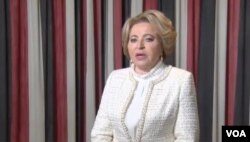As much of the world is shunning Russia for its invasion of Ukraine, Zimbabwe this month hosted Russia's third highest ranking official. Analysts say Zimbabwe is looking to Russia for fuel as well as cooking oil and wheat that it used to get from Ukraine, while Russia has its eyes on Zimbabwe's minerals.
During a visit to Zimbabwe last week, Valentina Ivanovna Matvienko, chairperson of the Federation Council of Russia, said Moscow would improve trade relations between the two countries given that the West was shunning them.
Alexander Rusero, who heads international relations studies at Africa University in Zimbabwe, says the nation's ties with Russia are both ideological and historical.
He says the relationship goes back to when Russia supplied arms to the now-ruling ZANU-PF party as it fought for Zimbabwe’s independence in the late 1970s.
Russia later vetoed proposed U.N. sanctions on Zimbabwe in 2008, when President Robert Mugabe won re-election through vote-rigging and heavy-handed intimidation.
“And given the realities that Zimbabwe is perceived as a pariah state, it is perceived as an outpost of tyranny by the Western international community, by the United States which is currently in an antagonistic relation with Russia, so Zimbabwe historically and ideologically will be leaned more to Russia and China than the Western international community,” said Rusero.
Harare-based independent political commentator Rejoice Ngwenya says Russia has an interest in Zimbabwe’s minerals, such as gold and platinum.
“Not to mention the business arrangements and relations that have been established in the last two decades. So it is not realistic to expect any drastic change of any policy between Zimbabwe and Russia on the basis of the Ukraine war. It is important to condemn invasions of any country, but unfortunately international politics also works in terms of self-interests and self-preservation,” said Ngwenya.
Zimbabwe depends on Russia and Ukraine for about 65 percent of its imported wheat. Since Russia invaded Ukraine, the price of bread and flour in the country has increased drastically as exports from the war zone have dried up.
“We have been affected. We are working with the government to bring in more wheat. We need as soon as possible. The commodity prices are going up, some of our wheat products such as bread are going up,” said Tafadzwa Musarara, the chairman of Grain Millers Association of Zimbabwe, which is in charge of importing grain.
Last week, Russian President Vladimir Putin said he considered Africa “friendly” and would make efforts to ensure goods in shortage reach the continent.
That would certainly be good news for countries like Zimbabwe, which even in the best of times struggles to feed its population.







